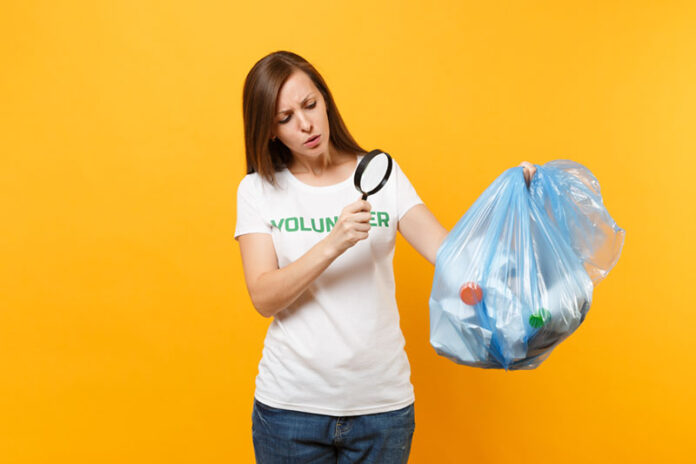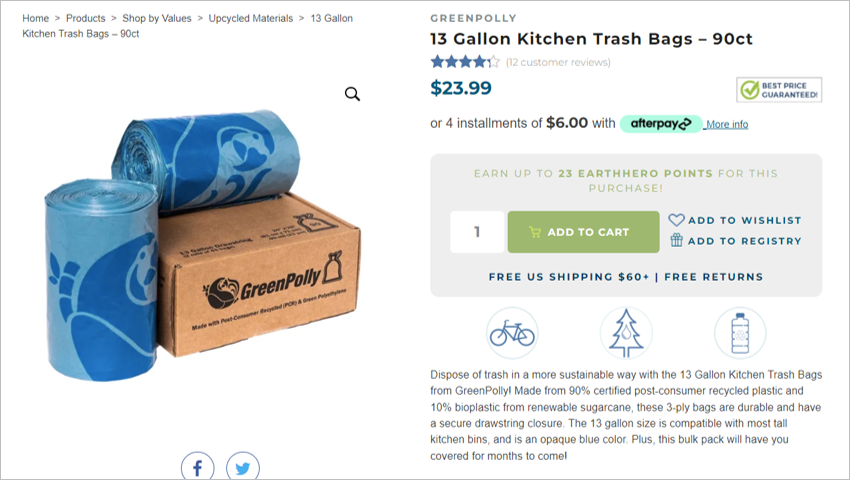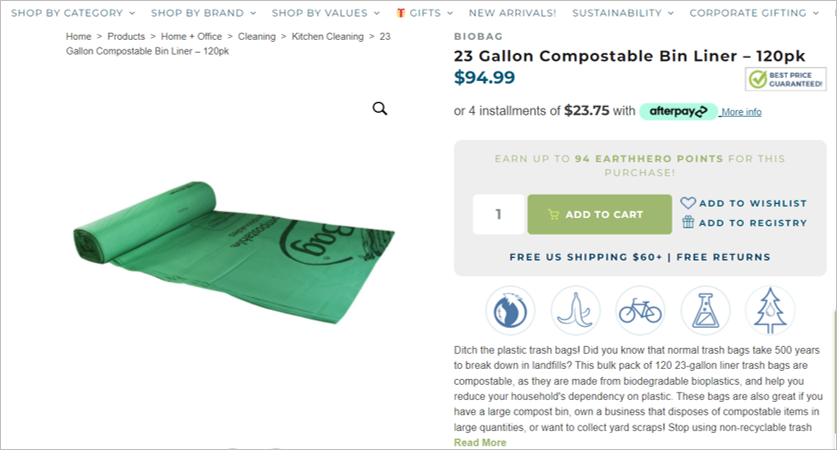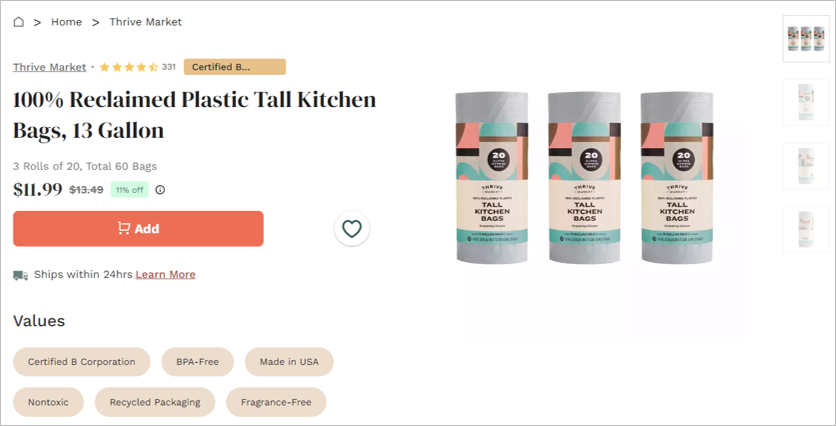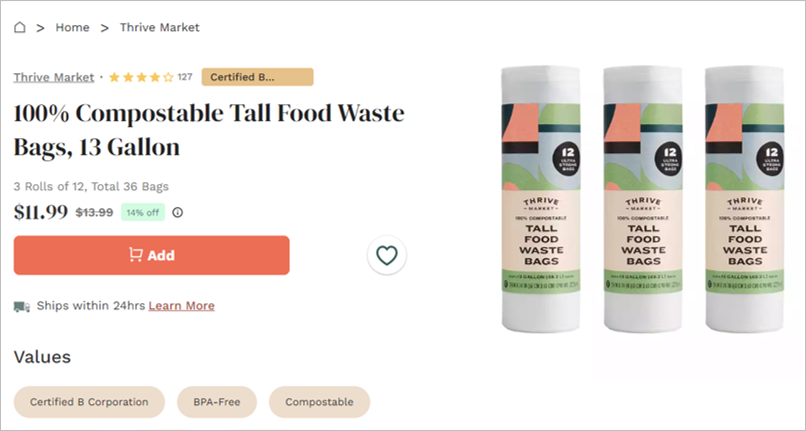Why do we need eco-friendly trash bags? When we think of plastic and ridding it from our homes, we’re quick to think of single-use plastics like straws, cups, and bags from the grocery store, but what about the single-use plastics that everything gets thrown away in?
Plastic is harmful to the planet. While they might receive as much criticism as, say, a plastic water bottle, trash bags also have a significant impact on our planet. Most are made from low-density polyethylene (LDPE), which is made from fossil fuels and has been known to break down into dangerous microplastics.
Unfortunately, as we’ve started to do away with plastic bags from grocery stores, we’ve seen an increase in the use of plastic trash bags, up to 120% according to Terrapass.
Fortunately, there are earth-friendly alternatives. We’ll explore exactly what makes for a sustainable trash bag, recommend some top brands, and provide tips for how you can make a DIY version of an eco-friendly trash bag.
Compostable vs Biodegradable
Typical single-use plastic bags take hundreds of years to break down.
Eco-friendly trash bags, on the other hand, are either compostable or biodegradable. There’s generally some confusion between the two, so let’s break these terms down further (pun intended).
- Biodegradable: According to Merriam-Webster, biodegradable products are “capable of being broken down especially into innocuous products by the action of living things (such as microorganisms).”
Essentially, these “innocuous” products are the natural elements an eco-friendly trash bag might break down into. Microorganisms will transform your green trash bag into earth-friendly biomass, carbon dioxide, and water.
According to Federal Trade Commission guidelines, products labeled as biodegradable must break down into elements found in nature within one year.
However, bear in mind that most landfills are bustling with toxic chemicals—not trash bag-consuming microorganisms. Additionally, when biodegradable materials breakdown in anaerobic conditions (like in a packed landfill), they release methane—which is 84 times more potent than CO2 (Environmental Defense Fund).
*For this reason, if you’re going to be sending your trash bags to a landfill, using 100% recycled plastic bags is better than compostable or biodegradable trash bags.
- Compostable (the better option): The Cambridge Dictionary describes compostable as, “something that is compostable and can be used as compost when it decays.”
Compostable materials are biodegradable, but they go one step further and are much better from an environmental standpoint. Compostable items are those that break down into non-toxic components, but can only do so in home or commercial compost facilities.
Many compostable products adhere to at least one standard, most commonly the American Compostable Standard (ASTM).
- ASTM D6400: the material biodegrades at an approved rate and produces usable compost (the composting standard)
- ASTM D6868: ALL parts of the material will compost in a municipal facility within 180 days and will not have adverse impacts
- ASTM D6866: the material will degrade into biomass, not fossil fuel components
Other certifications include the Biodegradable Products Institute (BPI) Logo, Cradle to Cradle (C2C), and TÜV OK Compost (one for industrial and home compostability). You can find a local compost facility using this website.
7 Top Choices for Eco-Friendly Trash Bags
1. GreenPolly 13 Gallon Kitchen Trashbags
These bright blue trash bags are made from 90% certified post-consumer recycled plastic along with 10% bioplastic made from renewable sugarcane. The bags are durable and have a drawstring closure. They also come in a recycled cardboard box.
These are a better option for anyone sending their trash to a landfill.
Available: EarthHero
2. Biobag 23 Gallon Compostable Bin Liner
Biobag makes a green trash bag that is made from biodegradable bioplastics, including those derived from plant starch, vegetable oils, and compostable polymers.
They are certified compostable by the BPI logo and meet ASTM D6400 criteria, meaning that they compost rapidly and safely in a commercial composting facility. They also come in a recycled box and are completely plastic-free, GMO-free, and BPA-free.
These are a better option for anyone sending their trash to a commercial composting facility.
Available: EarthHero
3. WasteZero 100% Reclaimed Plastic Small Trash Bag
This family-owned business uses post-consumer recycled material to make 100% reclaimed plastic trash bags. The bags are non-toxic, BPA-free, and better for Earth.
They’re also manufactured in the United States by a Certified B Corporation, and are great for anyone who doesn’t want to spend an arm and a leg on trash bags.
These are a better option for anyone sending their trash to a landfill.
Available: Thrive Market
4. WasteZero 100% Compostable Kitchen Trash Bag
The same company also makes 100% compostable kitchen trash bags. They are also non-toxic and BPA free, but are additionally certified by BPI to be fully compostable.
These are a better option for anyone sending their trash to a commercial composting facility.
Available: Thrive Market
5. UNNI ASTM D6400 100% Compostable Trash Bags
These green trash bags are certified compostable in both the United States and in Europe, and they adhere to BPI, ASTM, and TÜV OK Compost standards.
They’re made from some of the highest bio-based content found in trash bags and include no polyethylene. They use non-toxic plant starches instead of polyethylene and are some of the few trash bags that can be composted in home composting facilities.
These are a better option for anyone sending their trash to a home/commercial composting facility.
Available: Amazon
6. ProGreen 100% Compostable Bags
Here are some more green bags that adhere to BPI, ASTM, and TÜV OK Compost standards. Additionally, they also meet stricter California and New York state laws.
The bags are made with plant material instead of polyethylene and they’ll slowly break down naturally to keep our Earth healthy. They’re stronger and more flexible than many other compostable bags, too.
These are a better option for anyone sending their trash to a home/commercial composting facility.
Available: Amazon
7. Reli. Compostable Trash Bags
These eco-friendly green trash bags can be used in Municipal and Industrial composting facilities and are made from plant-based materials. They are certified by ASTM D6400.
The unique plant starch blend is suitable for composting, but should not be exposed to water, sunlight, or high temperatures, otherwise they may begin to break down.
These are a better option for anyone sending their trash to a commercial composting facility.

DIY Eco-Friendly Trash Bags
As can be seen in the biodegradability versus compostability debate, there isn’t a perfect solution when it comes to eco-friendly trash bags. In fact, the best thing we can do for our planet is to go without a trash bag entirely.
If you are recycling everything that can be recycled and composting all of your food scraps, using a washable and reusable trash can instead of trash bags is the best way to dispose of your rubbish.
If going sans bag is difficult for you, consider using a newspaper instead. If we go back a few decades, everyone was using newspapers to line their garbage can. Perhaps it’s time we bring back these old trends.
Here is how you can use an origami technique to make a recycled newspaper garbage liner, courtesy of Improvised Life.
Don’t have a lot of newspapers lying around? No worries, just consider asking for paper instead of plastic next time you go to the grocery store and use those instead of plastic trash bags. In a landfill, paper bags will only take about two to six weeks to decompose!
Final Thoughts on Eco-Friendly Trash Bags
Taking out the trash definitely isn’t glamorous, but it can be environmentally friendly. If you have any other sustainable trash tips, we’d love to hear them!

